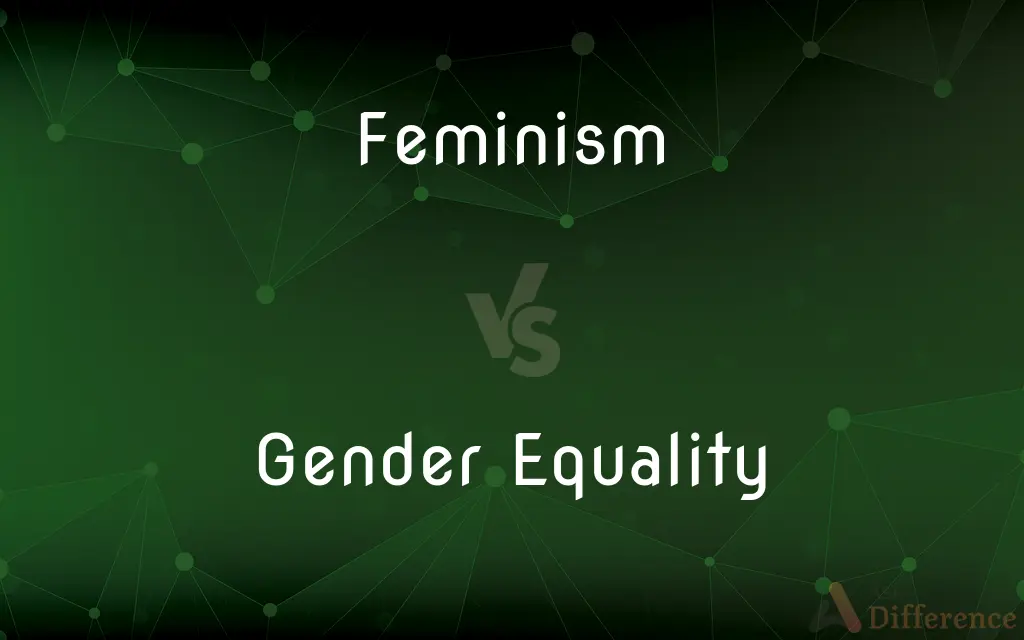Feminism vs. Gender Equality — What's the Difference?
Edited by Tayyaba Rehman — By Fiza Rafique — Published on October 20, 2023
Feminism advocates for women's rights based on gender equality, while Gender Equality is the equal rights, responsibilities, and opportunities of all genders.

Difference Between Feminism and Gender Equality
Table of Contents
ADVERTISEMENT
Key Differences
Feminism and Gender Equality, while intertwined in their pursuits, have distinctions in their focuses and histories. Feminism emerged as a movement and ideology to advocate for women's rights, addressing systemic inequalities faced by women due to their gender. It recognizes that historically, women have been disadvantaged, and it seeks to rectify this imbalance. On the other hand, Gender Equality is a broader concept emphasizing equal rights, responsibilities, and opportunities for all individuals, regardless of their gender. This encompasses not just women, but men, non-binary, and transgender people too.
While Feminism can be seen as a subset of the larger gender equality umbrella, it's essential to note that feminism itself has multiple waves and facets, each with different focuses and priorities. Gender Equality is more neutral and does not necessarily carry the historical or activist connotations that feminism does, but instead, it serves as a goal or an end-point that various movements, including feminism, aim to achieve.
Comparison Chart
Primary Focus
Women's rights
Equal rights for all genders
Historical Context
Emerged to combat women's oppression
Broader concept emphasizing gender neutrality
Scope
Primarily concerns women
Concerns all genders
ADVERTISEMENT
Activist Connotations
Often associated with activist movements
More of a broad goal or end-point
Intersectionality
Addresses intersections of gender with race, class, etc.
May not always delve into intersections
Compare with Definitions
Feminism
Addresses systemic issues of female oppression.
Feminism seeks to challenge and change patriarchal structures.
Gender Equality
Absence of discrimination based on gender.
Gender Equality in the workplace means equal pay for equal work.
Feminism
A movement advocating for women's rights.
Feminism has been instrumental in achieving voting rights for women.
Gender Equality
Recognizes and values different genders equally.
Gender Equality challenges traditional gender roles in households.
Feminism
The belief in and advocacy for gender equality, primarily focusing on women.
Through feminism, society has witnessed changes in workplace dynamics.
Gender Equality
Ensures no gender-based barriers in societal participation.
Gender Equality in education means both boys and girls have equal access to schooling.
Feminism
Can be categorized into different waves, each with distinct focuses.
Third-wave feminism introduced a broader spectrum of female voices.
Gender Equality
Equal rights, responsibilities, and opportunities for all genders.
Gender Equality ensures everyone has access to the same opportunities.
Feminism
The movement organized around this belief.
Gender Equality
Aims for equal representation in various sectors.
Gender Equality in politics involves having representation from all genders.
Feminism
(obsolete) The state of being feminine; femininity.
Feminism
A doctrine that advocates equal rights for women
Feminism
The movement aimed at equal rights for women
Common Curiosities
Does gender equality mean men and women are the same?
No, it means they should have equal rights, opportunities, and value, recognizing and respecting differences.
Are feminism and gender equality against men?
No, they advocate for equal rights, not the suppression of any gender.
Is gender equality achieved in modern societies?
While progress has been made, no society has fully achieved gender equality; disparities still exist.
Is feminism only for women?
While feminism primarily focuses on women's rights, it benefits all genders by challenging restrictive norms.
How does gender equality benefit society?
It fosters diversity, reduces inequalities, and promotes economic growth and social cohesion.
Do all feminists have the same beliefs?
No, feminism is diverse, and individuals may have different priorities and perspectives.
Can men be feminists?
Absolutely, anyone who supports women's rights and gender equality can identify as a feminist.
Why are there different waves of feminism?
Each wave addresses different societal issues and priorities related to women's rights at the time.
Are all feminists activists?
Not necessarily; while many are activists, some support the cause in different ways.
Can businesses benefit from gender equality?
Yes, diverse teams often result in better decision-making and innovation.
Is feminism only a Western concept?
No, while its manifestations differ, feminism exists and is vital in various cultures globally.
Is feminism a new concept?
No, the fight for women's rights has ancient roots, but modern feminism has more defined waves.
How can I support gender equality in daily life?
By challenging gender norms, supporting equal opportunities, and promoting inclusivity in personal and professional spaces.
Share Your Discovery

Previous Comparison
DSL vs. ADSL
Next Comparison
Anglican vs. EpiscopalAuthor Spotlight
Written by
Fiza RafiqueFiza Rafique is a skilled content writer at AskDifference.com, where she meticulously refines and enhances written pieces. Drawing from her vast editorial expertise, Fiza ensures clarity, accuracy, and precision in every article. Passionate about language, she continually seeks to elevate the quality of content for readers worldwide.
Edited by
Tayyaba RehmanTayyaba Rehman is a distinguished writer, currently serving as a primary contributor to askdifference.com. As a researcher in semantics and etymology, Tayyaba's passion for the complexity of languages and their distinctions has found a perfect home on the platform. Tayyaba delves into the intricacies of language, distinguishing between commonly confused words and phrases, thereby providing clarity for readers worldwide.














































